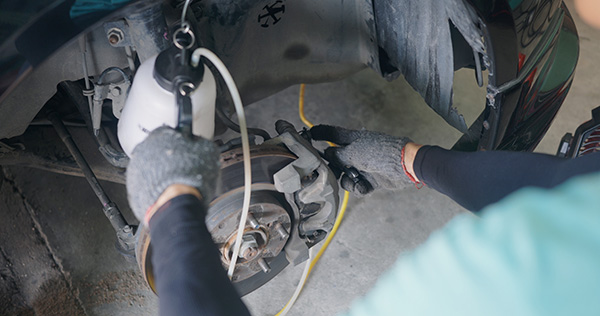
Do your brakes feel unpredictable? One moment, they're firm; the next, they're spongy. This inconsistency can be alarming, right? Braking issues are not just an inconvenience; they can be a serious safety hazard. So, what could be causing this erratic behavior? One potential culprit is air in the brake lines. But how does air get into the brake lines, and why does it cause such a problem? Let's explore the ins and outs of this issue and what you can do about it.
Understanding Brake Systems
To grasp why air in the brake lines is problematic, it's essential to understand how your brake system works. Modern vehicles typically use hydraulic brake systems, which rely on brake fluid to transfer the force from your foot on the brake pedal to the brake pads, ultimately slowing down your car. This system needs to be airtight to function correctly. When air enters the brake lines, it disrupts this hydraulic pressure, leading to inconsistent braking.
How Air Gets Into Brake Lines
1. Poor Maintenance and Fluid Changes
Air can sneak into your brake lines through various avenues. One common way is during maintenance or fluid changes. If the brake fluid reservoir is left open too long or the system isn't properly bled after a fluid change, air bubbles can become trapped in the lines. This is why it's crucial to have brake maintenance done by a professional who follows the correct procedures.
2. Worn or Damaged Components
Another pathway for air to enter the brake lines is through worn or damaged brake components. Over time, brake lines, seals, and other parts can degrade, allowing air to seep in. Regular inspections can help catch these issues before they lead to bigger problems.
3. Brake Fluid Leaks
Brake fluid leaks are a significant concern, as they can also introduce air into the brake lines. If there's a leak, the system loses its ability to maintain the necessary hydraulic pressure. This not only results in inconsistent braking but can also lead to brake failure if left unaddressed.
Symptoms of Air in Brake Lines
Inconsistent Braking
One of the most telling signs of air in the brake lines is inconsistent braking. You might notice that your brake pedal feels spongy or soft one moment and firm the next. This unpredictability can make it difficult to gauge how much pressure is needed to stop your vehicle safely.
Increased Stopping Distances
Air in the brake lines can cause increased stopping distances because the air bubbles compress when you apply the brakes, reducing the effectiveness of the hydraulic pressure. This means you'll need to press the brake pedal further to achieve the same braking force.
Brake Pedal Goes to the Floor
If the brake pedal goes all the way to the floor when you press it, this clearly indicates a problem. While this could be due to various issues, air in the brake lines is a likely suspect. This symptom should never be ignored as it signifies a severe reduction in braking capability.
Diagnosing and Fixing the Problem
Bleeding the Brakes
If you suspect air in your brake lines, the most common fix is to bleed the brakes. This process involves removing the air bubbles by forcing brake fluid through the brake lines. While some vehicle owners might attempt to do this themselves, it's usually best left to professionals who have the right tools and expertise to do it correctly.
Inspecting for Leaks
Alongside bleeding the brakes, inspecting the brake system for any signs of leaks is crucial. Even a small leak can introduce air into the brake lines and compromise your braking system. Regular maintenance checks can help catch leaks early before they lead to more severe problems.
Replacing Worn Components
Sometimes, fixing the issue requires replacing worn or damaged components within the brake system. This might include brake lines, seals, or other parts that can no longer maintain the necessary airtight environment for proper brake function.
Preventative Measures
Regular Maintenance
The best way to prevent air from entering your brake lines is through regular maintenance. This includes timely brake fluid changes, inspections for leaks, and ensuring that all components are in good condition. Keeping up with your vehicle's maintenance schedule can go a long way in ensuring your brakes remain reliable.
Using Quality Brake Fluid
Using high-quality brake fluid and ensuring it's topped up to the right level can also help prevent air from entering the brake lines. Quality fluid is less likely to attract moisture, which can lead to air bubble formation within the system.
Don't compromise your safety! Schedule a brake inspection at Autobahn Auto Repair today to ensure your brake system is in perfect working order.